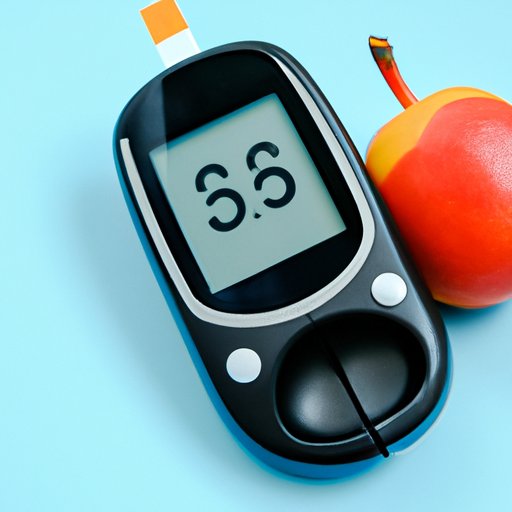
I. Introduction
High blood glucose levels can cause a range of health issues, from diabetes to heart disease and more. Fortunately, there are steps you can take to control your glucose level and improve your overall health. In this article, we will explore five simple lifestyle changes that can help lower your blood glucose levels, the importance of monitoring your blood glucose levels, natural herbs and supplements that can help regulate blood glucose levels, how the glycemic index can aid in blood sugar management, and doctor-recommended medications to control glucose levels.
II. 5 Simple Lifestyle Changes to Lower Your Blood Glucose Levels
1. Healthy Eating Habits: Eating healthy can help manage your blood sugar. Avoid sugar, processed foods, and simple carbohydrates. Instead, choose foods rich in fiber, lean protein, and complex carbs. Be mindful of portion sizes and aim to eat a balanced diet.
2. Exercise Regularly: Regular exercise is essential and can help control glucose levels. Aim for at least 30 minutes of moderate exercise every day. Exercise can increase insulin sensitivity, which can help your body regulate glucose levels more effectively.
3. Stress Reduction: High stress levels can cause glucose levels to rise. Practice stress-reducing techniques such as meditation, yoga, or deep breathing exercises. These techniques can reduce stress and regulate glucose levels.
4. Quality Sleep: Lack of sleep can cause glucose levels to rise. Aim for seven to eight hours of quality sleep each night to keep your glucose levels stable. Stick to a consistent sleep schedule, avoid caffeine and electronics before bed, and create a relaxing sleep environment.
5. Eliminate Alcohol and Smoking: Alcohol and tobacco use can both raise glucose levels. Quitting or reducing smoking and moderating alcohol consumption can help regulate your blood glucose levels.
III. The Importance of Blood Glucose Monitoring for Diabetics
Blood glucose monitoring is essential for those with diabetes. It allows you to track your glucose levels and take corrective action if necessary. To properly monitor blood glucose levels, you need a glucometer and testing strips. Follow the manufacturer’s instructions and take readings at the recommended times. Be sure to log your results and share them with your doctor.
IV. Herbs and Supplements to Help Control Blood Sugar
Some natural herbs and supplements can help maintain blood glucose levels. For example, cinnamon, fenugreek, and turmeric are known for their glucose-regulating properties. However, it’s important to note that natural remedies are not a substitute for medical treatment, and dosage and potential interactions should be explored before taking any herbs or supplements.
V. The Glycemic Index: How It Can Help Lower Blood Sugar
The glycemic index (GI) is a rating system that measures how quickly carbohydrates raise blood glucose levels. Low GI foods release glucose into the bloodstream more slowly and steadily than high GI foods, helping to regulate glucose levels. Foods with low GI ratings include whole grains, legumes, nuts, and non-starchy vegetables. Incorporating these foods into your diet can lower your blood glucose levels and improve your overall health.
VI. Doctor-Recommended Medications to Control Glucose Levels
If lifestyle changes are not enough to regulate your glucose levels, your doctor may recommend medications. These drugs work to lower blood glucose levels by increasing insulin production or improving insulin sensitivity. Possible side effects of medication use include weight gain, low blood sugar, and digestive issues. Speak with your doctor about which medication is right for you and how to manage any potential side effects.
VII. Conclusion
Controlling your glucose levels is key to maintaining good health. Incorporate healthy eating habits, regular exercise, stress reduction techniques, quality sleep, and eliminate alcohol and tobacco use. Monitor your blood glucose levels, use natural herbs and supplements if suitable, and take recommended medications if necessary. By doing so, you can keep your glucose levels stable and protect your overall health.




